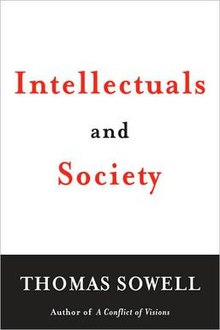This book is a withering criticism of the class of society that Thomas Sowell calls the “intellectuals” (journalists and columnists, public intellectuals, writers, sociologists).
Sowell’s thesis is that intellectuals try to persuade the public to support policies that may do greater harm than good while enjoying complete immunity from the bad consequences of their recommendations. For example in the 1920’s and 1930’s intellectuals widely called for disarmament, making it very difficult for British politicians to order the military to arm itself in response to Nazi Germany’s growing military power. The intellectuals in charge of Britain’s media had created an atmosphere where politicians would have risked their jobs if they had done what they know to be right, since the public had been indoctrinated by the intellectuals to fight rearmament. In this way the intellectuals were responsible for making Britain almost lose World War II to Germany, and yet no intellectual faced any consequences for recommending such a self-defeating policy.
Thomas Sowell is an economist and in this role considers the intellectuals pests in issues of economic policy. They recommend vast changes in economic policy without having the competence to understand the consequences, and without suffering any repercussions when their policy recommendations do great harm to major sections of society.
Intellectuals throughout the 20th century have called for gun control laws, thinking that this would make society safer. They ignore the fact that Switzerland, where gun ownership is extremely high, suffers far less crime than the United States. And when intellectuals in Britain managed to pass strong control laws, this actually lead to a vast increase in crime. Intellectuals also strongly supported weaker punishments of criminals in Britain, which according to Sowell is partly responsible for Britain’s crime crisis. And when conservatives in the United States managed to create strong anti-crime policies in the 1990’s, which lead to a sharp decline in crime, the intellectuals only expressed bewilderment at this “unexplainable” phenomenon when to Sowell the explanation is extremely obvious: keeping more criminals in prison means fewer criminals out there committing crime.
This book should be required reading for all Muslim intellectuals living in the West. It is a great help in creating a critical attitude toward nice-sounding popular doctrines promoted by Western intellectuals.
Sowell belongs to the neoconservative Hoover Institution. He shares the anti-Muslim bias of neoconservatives; almost all mentions of Muslims in his books are negative (while having worked extremely hard to defend the image and rights of Jews while always ignoring the possibility that Jewish behavior may have had something to do with anti-Semitism). In this book he does not disappoint:
The intelligentsia in some European nations have gone further—being apologetic to Muslims at home and abroad, and having acquiesced in the setting up of de facto Muslim enclaves with their own rules and standards within Europe, as well as overlooking their violations of the national laws in the European countries in which Muslim immigrants have settled.
The Hoover Institution is active in promoting the image of Muslims as the West’s new Jews as the Jews were seen in the past: separate, alien, unpatriotic, living in enclaves, and having large numbers of anti-Western radicals among them.
However, Sowell’s anti-Muslim bias should be no obstacle to Muslims to benefit from his expertise and his very important work in promoting a more rational intellectual atmosphere and in defending Western civilization from, ironically, largely Jewish attempts to undermine its pride and patriotism. Jews are heavily over-represented among the intellectuals he criticizes in this book; he comes back again and again to the Jewish Supreme Court justice Louis Brandeis, who spent his career working to weaken the US Constitution in order to make room for his own elitist agenda. Brandeis was followed in prominence by the Jewish legal scholar Ronald Dworkin, who continued the project of justifying twisting the Constitution and the law in order to make judges and legal scholars the elite who decide what the law should be for the masses. Sowell also reserves much criticism for heavily-Jewish (and extremely elitist) media outlets like The New York Times. He also often criticizes fields of academia heavily influenced by Jewish activists, such as sociology, which was permanently biased against the West in the aftermath of the works of Freud, Franz Boas and the key members of the Frankfurt School, all of whom were Jewish with strong Jewish identities and obvious anti-Western agendas.
